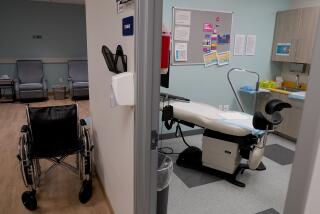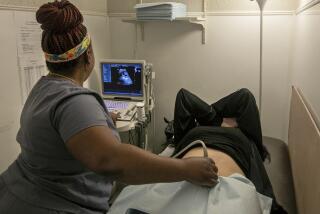Pregnancy brain is real, lasting — and probably good for baby

New research suggests that, in some cases, the brain of a first-time mother stays changed for at least two years after she has given birth. (Dec. 20, 2016)
At some point in the course of pregnancy, a woman is likely to suspect that the baby she is incubating has somehow hijacked her brain. New research suggests that, in some sense, she’s right, and that pregnancy itself is altering her brain like no other experience she’s had since adolescence.
A first, pregnancy exacts extensive reductions in the volume of gray matter in a woman’s brain, a new study finds. The places where a pregnant woman’s brain shrinks are very specific, the research says. The structural renovations wrought by pregnancy appear to overlap almost perfectly with the brain regions that play a key role in how we understand and interpret the actions, intentions and feelings of others.
And the brain of a first-time mother stays changed — for at least two years after she has given birth, according to the new research, published Monday in the journal Nature Neuroscience.
Pregnant women did not lose intellectual ground, the researchers found: As a group, their working memory and memory for words were no better or worse than they were before pregnancy. But in the network of structures that processes faces and reads emotional cues, some kernel of emotional intelligence appeared to be forming.
To glean these findings, neuroscientists in Spain and the Netherlands did something that has never been done before: They took images of the brains of women at a point when they were hoping to become pregnant with their first child, and then (in those who succeeded) immediately after they gave birth. To compare whether and in what ways these women’s brains changed, the researchers also performed detailed brain scans on women who were not pregnant, and on men who were expecting their first child.
Both comparison groups offered some insight into what was causing the brains of pregnant women to change. The men, like the women, were preparing for new and unfamiliar roles as parents. The women who were not pregnant were also dreaming of becoming parents. But their bodies were not subject to pregnancy’s physiological challenges.
What set the pregnant women apart, then, was likely the storm of pregnancy-induced hormonal changes they were experiencing. Pregnancy’s fluctuating waves of estrogen, progesterone, testosterone and other sex-hormones are unlike any other hormonal roller-coaster ride experienced over a woman’s lifespan.
As humans bonded together for survival, the researchers wrote, evolution needed to increasingly sculpt a woman’s brain in ways that would ensure her baby could thrive. Hormones, they suggest, became the chisel.
In fact, the researchers found that the patterns of structural change in women’s brains were sufficient to distinguish women who had recently given birth from women who had not.
And it predicted much more. Among the 25 women who went through pregnancy and childbirth, the more pronounced the structural changes observed in a woman’s brain, the higher her level of attachment was to her infant, and the lower her level of hostility was toward her newborn.
For the record, the researchers found no difference in brain structure changes or maternal nurturance behaviors between women who became pregnant with the assistance of fertility treatments and those who became pregnant the old-fashioned way.
Brain shrinkage may not sound like a formula for enhancing one’s ability to read and respond to the myriad unspoken needs and feelings an infant has. But consider that one of life’s other periods of brain-volume reduction — late adolescence — also corresponds to a period in life when humans are developing and enhancing key social and cognitive skills needed for the transition to adulthood.
When it comes to brain volume, sometimes less is less (as, for instance, when Alzheimer’s disease, multiple sclerosis and AIDS result in progressive brain-volume reductions). But sometimes, less is more — as seems to be the case when the riot of neuronal connections built up through childhood goes through a ruthless pruning as a child nears adulthood.
It undoubtedly matters what kind of brain tissue is lost — whether it’s neurons or synapses (the tendrils that carry electrical signals from one cell to another), or white matter (bundles of connective tissue) or glial cells, which have important housekeeping functions in the brain.
In the current study, the researchers acknowledge that they do not know exactly which kind of brain tissue pregnancy prunes. But they do see the volume reduction in regions of the brain that play a key role in social functioning as a change that sharpens a woman’s ability to tend to her baby’s needs.
“We may speculate that the female brain undergoes a further maturation or specialization of the neural network subserving social cognition during pregnancy,” the authors wrote. “Very few studies have investigated the effects of pregnancy on measures of social cognition, but there are preliminary indications of facilitated processing of social information in pregnant women, including enhanced emotion and face recognition.”
Follow me on Twitter @LATMelissaHealy and “like” Los Angeles Times Science & Health on Facebook.
MORE IN SCIENCE
Hundreds of species are already going locally extinct because of climate change, study says
To mobilize Trump’s America for environmental protection, invoke the past
Sorry, Pokemon Go addicts, playing the video game doesn’t count as a real workout







